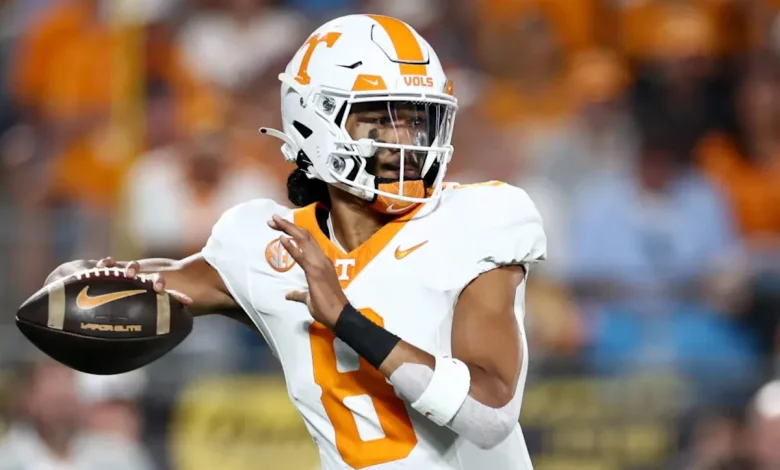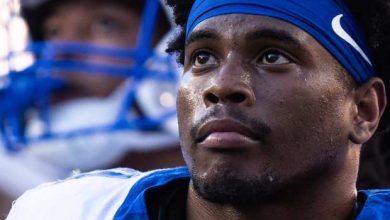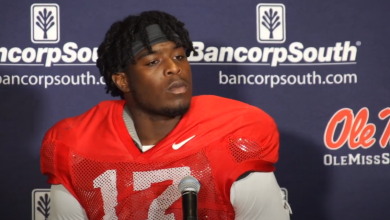Nico Iamaleava missed Vols’ spring practice amid NIL contract discussions, fueling speculation about a potential transfer or deal.

In the ever-evolving world of college football, where player compensation and recruitment dynamics are shifting dramatically due to the influence of Name, Image, and Likeness (NIL) agreements, the case of Tennessee quarterback Nico Iamaleava has become a significant talking point. His recent absence from spring practice, reportedly linked to ongoing NIL contract discussions, has raised a slew of questions about his future with the Vols and whether this could be a sign of a larger trend in college football.
Iamaleava, a highly touted five-star quarterback who was expected to be the face of Tennessee’s offense for the foreseeable future, has not only displayed remarkable talent on the field but also captured significant attention off of it due to his potential NIL earnings. The combination of his on-field abilities and the financial opportunities that come with NIL deals has made him a valuable asset—not just for Tennessee, but for any program looking to add a quarterback with the tools to make an immediate impact.
However, his recent absence from Tennessee’s spring practices has led to widespread speculation about his status with the team. With rumors circulating that Iamaleava is in the midst of negotiating NIL deals, many are wondering if he is considering a transfer or if this situation signals a new trend in college football: the increasing involvement of NIL negotiations affecting players’ decisions to stay or leave their programs.
A Rising Star: Nico Iamaleava’s Journey to Tennessee
Before diving into the NIL and transfer speculation, it’s crucial to understand why Nico Iamaleava is such a highly regarded player. Hailing from Long Beach, California, Iamaleava was one of the most sought-after recruits in the 2023 class. Standing at 6’6″ with an arm capable of launching passes deep downfield, he possesses the physical tools that NFL scouts drool over. His athleticism, mobility, and ability to read defenses put him on the fast track to stardom in college football.
Iamaaleava was ranked as one of the top quarterbacks in his recruiting class, and his commitment to Tennessee generated immense excitement among Vols fans. He joined a program under the guidance of head coach Josh Heupel, whose up-tempo offense was designed to take full advantage of Iamaleava’s strengths. The combination of his immense talent and Heupel’s system, which thrives on fast-paced play and big plays, was seen as a perfect match.
In his freshman year, Iamaleava did not immediately take over as the starting quarterback, with veteran Joe Milton holding onto the role. However, Iamaleava saw significant action, especially in key games like the Citrus Bowl, where he threw for over 200 yards and demonstrated his ability to command the offense. It became clear that his time as the starting quarterback was rapidly approaching, and Tennessee’s expectations for the future were sky-high.
The NIL Revolution
NIL, which allows college athletes to profit from their name, image, and likeness, has completely transformed the landscape of college athletics. This new era of college sports opened the door for players to secure lucrative endorsement deals, creating opportunities to earn money while still in school. While many players across different sports have capitalized on this new system, football players, especially those in the quarterback position, have seen the largest influx of NIL money.
Nico Iamaleava is no exception. When he first committed to Tennessee, reports surfaced that he had signed one of the most lucrative NIL deals for a high school player at the time, with estimates putting the value of his deal at around $3 million. That was back in 2023, before NIL had fully matured, and the market for top-tier quarterbacks was still evolving.
However, as time went on, the competition for NIL deals grew fiercer, and more players began securing even more significant contracts. As NIL continues to grow in importance, the expectations placed on high-profile players like Iamaleava have also grown. With this new landscape comes the pressure to not only perform on the field but also to maximize earning potential off it.
The Speculation Around Iamaleava’s Absence
As the 2025 spring football season kicked off, fans were eager to see how Iamaleava would perform in Tennessee’s new-look offense. However, his absence from the first few practices raised eyebrows. Sources close to the team suggested that Iamaleava’s absence was tied to ongoing negotiations concerning his NIL deal. While the specifics of the deal were not made public, there were indications that tensions may have arisen around the terms of his contract.
Some insiders suggested that Iamaleava was frustrated with the current state of his NIL situation, especially as other quarterbacks around the country secured deals worth far more than his reported $3 million. With the transfer portal being an ever-present option for players seeking more favorable circumstances, it’s not surprising that Iamaleava might consider exploring his options if the right offer came along.
This absence also came at a time when the transfer portal was about to open on April 16, further fueling speculation that Iamaleava could be exploring other opportunities. In this era of college football, where players have the ability to transfer without sitting out a season, it’s not uncommon for star players to entertain the idea of moving if the financial terms aren’t to their liking or if they feel that another program might provide a better platform for their career.
The Influence of NIL on College Football
Nico Iamaleava’s situation highlights the increasing influence of NIL in college football and raises important questions about the future of the sport. Traditionally, players were bound to their respective programs for at least three years, with the decision to enter the NFL Draft being the primary avenue for them to seek greater opportunities. However, NIL has fundamentally altered the power dynamic between players and schools.
In today’s environment, the ability for players to negotiate their value based on their name, image, and likeness gives them leverage in ways that were previously unimaginable. Programs are now competing not only for talent but also for the best NIL deals, which often involve third-party sponsors, booster programs, and other outside entities. This creates a complex web of influences that can affect a player’s decision to stay or leave a school.
NIL has also exacerbated the transfer portal’s impact on college football. The idea of a player being able to move freely from one program to another, especially after just one season, can significantly disrupt team continuity. Coaches must now balance their recruitment efforts with the reality that their players might leave for a more lucrative opportunity if the financial situation isn’t satisfactory.
The Potential Impact on Tennessee Football
For Tennessee, Iamaleava’s potential departure would be a significant blow. The Vols have built their offense around his skills, and losing him could drastically change the course of their program. While Joe Milton is still on the roster, the team’s expectations with Iamaleava as the starter were much higher, and his exit would create a substantial gap at the quarterback position.
Moreover, Iamaleava’s departure would have ripple effects on Tennessee’s recruiting efforts. Other top recruits, particularly quarterbacks, may hesitate to commit to a program where NIL disputes or player movement seem to be an ongoing issue. Losing a highly regarded prospect like Iamaleava could damage the Vols’ reputation as a destination program for elite quarterbacks.
Could Iamaleava Leave? What’s Next?
While it remains to be seen whether Iamaleava will ultimately leave Tennessee, his situation is a reminder of the larger changes sweeping through college football. Players are no longer just athletes; they are brands, with agents and representatives who negotiate deals that go far beyond the football field. Whether Iamaleava stays or goes, his situation will be one to watch as it could signal the start of a new trend in college football: where NIL discussions become just as important as game-time performance.
If Iamaleava decides to enter the transfer portal, it would mark a significant moment in the evolution of college football, where star players use their leverage in ways previously unheard of. For Tennessee, losing Iamaleava would not only hurt them on the field but also raise questions about how they manage their NIL deals going forward. The next few months will be pivotal for both Iamaleava and Tennessee, and college football fans across the nation will be watching closely.









